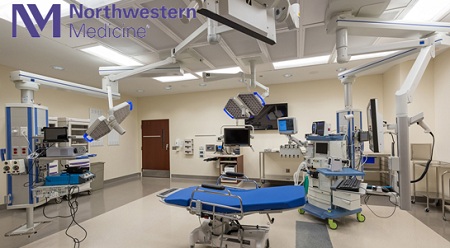The new Mobile Stroke Unit (MSU) at Northwestern Medicine Central DuPage Hospital (CDH) is designed to shorten the delivery time of life-saving stroke treatments by offering highly specialized stroke care to the patient in the field.
“The Mobile Stroke Unit demonstrates the commitment of physicians, nurses and staff to provide high-quality, compassionate care to our community. We are proud to be the first hospital in Illinois to offer this truly innovative technology aimed at reducing the deadly and devastating impact of stroke,” said Brian Lemon, president, Northwestern Medicine Central DuPage Hospital.
Northwestern Medicine is the first in Illinois to receive approval by the State of Illinois to operate a Mobile Stroke Unit. The specialized ambulance is equipped with a 16-slice CT scanner to take detailed images of the brain, a direct telemedicine connection to neurologists at CDH and clot-busting medication.
“Treatment can be initiated within minutes of responding to a call. This is crucial because when it comes to stroke, time is a factor in treatment,” said Harish Shownkeen, MD, medical director of the Stroke and Neurointerventional Surgery Programs at Northwestern Medicine Central DuPage Hospital. “For every minute you delay in getting treated for a stroke, you lose 1.9 million neurons.”
The MSU Stroke Care team includes a critical care nurse, CT technician, critical care paramedic, and emergency medical technician, who communicate with a neurologist via live video streaming.
Patients within the CDH EMS service area, which includes Carol Stream, Glen Ellyn, Roselle, West Chicago, Wheaton and Winfield, will contact the MSU by calling 9-1-1 and reporting stroke-like symptoms. The 9-1-1 dispatchers will alert both the local EMS agency and the MSU team, and both ambulances will be sent to the scene.
Once on scene, paramedics will assess the patient and complete a field stroke assessment. If a stroke seems likely, they will turn care of the patient over to MSU team members. The MSU team will contact the on-call CDH neurologist using real-time, encrypted audio and video and perform a CT scan. If the neurologist diagnoses an ischemic stroke, the clot-busting drug tissue plasminogen activator (tPA) will be administered at the direction of the neurologist. Patients without an ischemic stroke will be treated appropriately by the EMS and MSU teams.
“We are essentially delivering Emergency Room technology directly to the patient,” said Stephen Graham, MD, EMS medical director at Northwestern Medicine Central DuPage Hospital. “It’s important for members of the community to know the stroke symptoms they should be looking for so that we can be there as soon as possible to help them.”
FAST is an easy way to remember the sudden signs of stroke. When you spot the signs, call 9-1-1 right away. FAST is: Face drooping, Arm Weakness, Speech Difficulty, Time to call 9-1-1.
Stroke is the leading cause of disability and the fourth leading cause of death in Illinois according to the Illinois Department of Public Health.
CDH has earned the Advanced Comprehensive Stroke Center designation by The Joint Commission. The highest level of stroke certification, this designation recognizes the significant resources in staff, training and state-of-the-art infrastructure that comprehensive stroke centers must have to treat complex cases.























